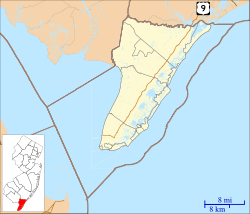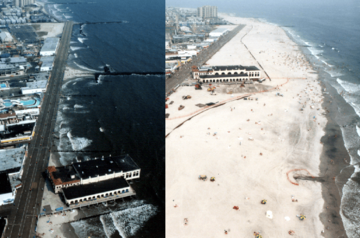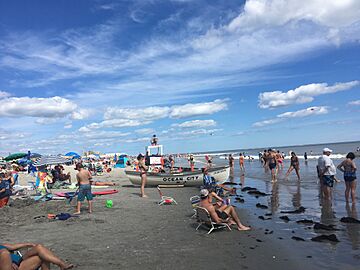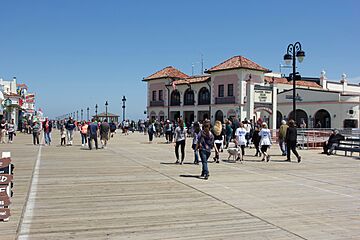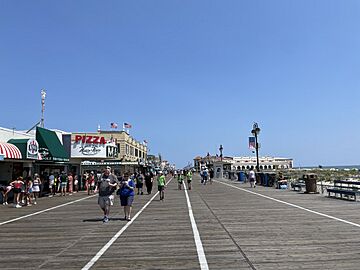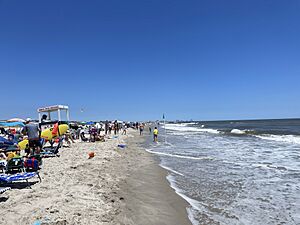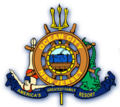Ocean City, New Jersey facts for kids
Quick facts for kids
Ocean City, New Jersey
|
|||
|---|---|---|---|
|
City
|
|||
| City of Ocean City | |||
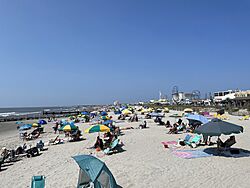
Ocean City beach from Music Pier, August 2023
|
|||
|
|||
| Motto(s):
"America's Greatest Family Resort"
|
|||
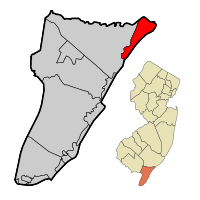
Location of Ocean City in Cape May County highlighted in red (left). Inset map: Location of Cape May County in New Jersey highlighted in orange (right).
|
|||
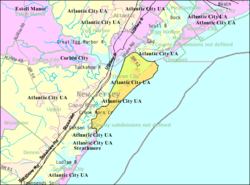
Census Bureau map of Ocean City, New Jersey
|
|||
| Country | |||
| State | |||
| County | |||
| Incorporated | May 3, 1884 (as borough) | ||
| Reincorporated | March 25, 1897 (as city) | ||
| Government | |||
| • Type | Faulkner Act (mayor–council) | ||
| • Body | City Council | ||
| Area | |||
| • Total | 11.55 sq mi (29.93 km2) | ||
| • Land | 6.75 sq mi (17.49 km2) | ||
| • Water | 4.80 sq mi (12.44 km2) 41.87% | ||
| Area rank | 196th of 565 in state 5th of 16 in county |
||
| Elevation | 7 ft (2 m) | ||
| Population
(2020)
|
|||
| • Total | 11,229 | ||
| • Estimate
(2023)
|
11,242 | ||
| • Rank | 222nd of 565 in state 4th of 16 in county |
||
| • Density | 1,662.8/sq mi (642.0/km2) | ||
| • Density rank | 324th of 565 in state 5th of 16 in county |
||
| Time zone | UTC−05:00 (Eastern (EST)) | ||
| • Summer (DST) | UTC−04:00 (Eastern (EDT)) | ||
| ZIP Code |
08226
|
||
| Area code(s) | 609 Exchanges: 391, 398, 399, 525, 814 | ||
| FIPS code | 3400954360 | ||
| GNIS feature ID | 0885332 | ||
Ocean City is a fun city in Cape May County, New Jersey. It's known as "America's Greatest Family Resort." This city is famous for its beautiful beaches and a long boardwalk.
Ocean City is special because it has not allowed the sale of alcohol since it was founded in 1879. This makes it a popular spot for families. In the summer, the city's population grows a lot, with many tourists coming to enjoy the sun and sand.
Travel Channel called Ocean City the "Best Family Beach" in 2005. It has also won awards for being a top beach in New Jersey.
Contents
History of Ocean City
Before Ocean City was built, Native Americans used the island for summer fishing camps. Later, it was known as Peck's Beach, named after a whaler named John Peck. He used the island to store whales he had caught.
In 1879, four Methodist ministers decided to create a Christian retreat here. They named it Ocean City. They planned streets and places for homes and businesses. The first school opened in 1881. Bridges and railroads soon connected the island to the mainland.
In 1920, the city adopted its famous slogan, "America's Greatest Family Resort." A big fire in 1927 damaged the boardwalk. When it was rebuilt, it was moved closer to the ocean.
Geography and Beaches
Ocean City is on a barrier island. It's about 8 miles (13 km) long. The city is surrounded by water, with the Atlantic Ocean to the east.
Because of storms, the beaches sometimes lose sand. This is called erosion. To fix this, sand is added back to the beaches. This process is called "beach replenishment." The United States Army Corps of Engineers helps keep the beaches wide and sandy.
Fun Things to Do
Ocean City uses a lot of its land for parks and fun activities. There are many playgrounds across the island. You can also find courts for volleyball, basketball, and tennis. There are fields for baseball and soccer too.
Parks and Nature
The Howard Stainton Wildlife Refuge is a wetland area where you can see nature. There's a viewing platform to watch wildlife. The Ocean City Municipal Golf Course is also open to the public.
At the south end of the island is Corson's Inlet State Park. This park helps protect a natural part of the coastline. It's a great place to explore nature.
Beach Tags
To help pay for keeping the beaches clean and safe, Ocean City uses "beach tags." If you are 12 or older, you need a tag to go on the beach during the summer. The money from these tags helps pay for lifeguards and beach maintenance. Military personnel can get free seasonal beach tags.
The Boardwalk
Ocean City has a famous boardwalk that is about 2.5 miles (4 km) long. It's a great place for walking, biking, and enjoying the ocean views. The boardwalk was first built in 1880. After a big fire in 1927, it was rebuilt closer to the ocean.
Boardwalk Attractions
The boardwalk has many exciting attractions:
- Gillian's Wonderland Pier: This is an amusement park with many rides. It opened in 1965.
- Playland's Castaway Cove: Another amusement park with thrilling rides. It has roller coasters like GaleForce, which goes very fast!
- OC Waterpark: A water park that is open during the summer months.
- Mini Golf: There are several mini golf courses along the boardwalk for family fun.
Education in Ocean City
The Ocean City School District serves students from pre-kindergarten through 12th grade. There are three schools in the district:
- Ocean City Primary School (PreK-3)
- Ocean City Intermediate School (grades 4-8)
- Ocean City High School (grades 9-12)
Students from nearby towns like Corbin City, Longport, Sea Isle City, and Upper Township also attend Ocean City High School. There are also special schools like Cape May County Technical High School for vocational programs.
Transportation in Ocean City
Ocean City is connected to the mainland by several bridges. These bridges make it easy for people to drive to and from the island.
- The 34th Street Bridge connects to Upper Township.
- The Ocean City-Longport Bridge connects to Egg Harbor Township.
- The 9th Street Bridge (Route 52) connects to Somers Point.
NJ Transit provides bus service to places like Atlantic City. During the summer, a special Jitney service helps people get around the city, especially to the boardwalk.
Ocean City also has a small airport called Ocean City Airport. It was built in 1935.
Climate and Weather
Ocean City has a humid subtropical climate. This means it has hot, humid summers and cool winters. A cool ocean breeze often helps keep summer days pleasant. Sometimes, there can be very hot and humid weather. In winter, it can get very cold and windy.
The area gets some snow each year, usually between 12 to 18 inches (30 to 46 cm). February is often the snowiest month.
In 2012, Hurricane Sandy caused a lot of flooding and strong winds in Ocean City. The storm caused damage to many homes.
Famous People from Ocean City
- Marla Adams (born 1938), TV actress
- David Akers (born 1974), former NFL football player
- Anne Heche (1969−2022), actress
- Grace Kelly (1929–1982), famous actress and Princess of Monaco
- Kurt Loder (born 1945), former editor of Rolling Stone magazine
- Ed Rendell (born 1944), former Governor of Pennsylvania
- Dominic Sessa (born 2002/03), actor
- James Stewart (1908–1997), actor
- Gay Talese (born 1932), author
Images for kids
See also
 In Spanish: Ocean City para niños
In Spanish: Ocean City para niños
 | Toni Morrison |
 | Barack Obama |
 | Martin Luther King Jr. |
 | Ralph Bunche |




